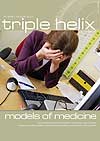12 May 2010 saw the close of the Scottish parliament's public consultation on the End of Life Assistance (Scotland) Bill, expected to be voted upon at the end of the year. This Bill was put forward by Margo MacDonald – Scotland's only independent MSP – who suffers from Parkinson's disease.
The overall aim, supposedly to legalise both euthanasia and assisted suicide, is based on a very strong understanding of autonomy. As Ms MacDonald herself acknowledges: 'The Bill and its motivation rests on respect for the ability of those with a progressive, irreversible condition and/or terminal illness to decide whether or not their lives have become intolerable and whether or not they would prefer to seek assistance to end their own lives'. (2)
It is clear the Bill is about (1) choosing whether or not to end one's life; (2) choosing when and where to do this; (3) choosing who should assist; and (4) choosing how to end one's life. Should this Bill eventually become law, however, worrying expectations arise for healthcare professionals. For example, they would have to:
- Make judgments about the intolerability of someone else's life
- Agree with the person on the actual method of termination (the Bill assumes that doctors actually have the required expertise)
- Agree with them on who should actually conduct the life-terminating procedure (it does not necessarily have to be the doctor) and where this will happen
- Provide or administer appropriate means for the life to be terminated
- Be present at the actual life-terminating procedure, even if not conducting it
- Be obliged either to provide for assisted dying, or to refer the person to another doctor prepared to do it – there is no conscience clause permitting opt out
The sanctity of life, historically a foundation stone for society in general and for medical practice in particular, would be compromised. A grave insult to Christian values could become unimportant and commonplace. The legislation would fundamentally change the role of the physician, change the doctor-patient relationship, and change the role of medicine in society.
The Committee released on 18 June a preliminary analysis of the consultation responses. Of 610 submissions, 521 were opposed, 39 supportive of the Bill or at least the principle behind it, and 41 had no position. (3)
To object, support Care Not Killing; (4) Scots can contact their MSP; GPs in Scotland can sign the letter of opposition. (5)
































